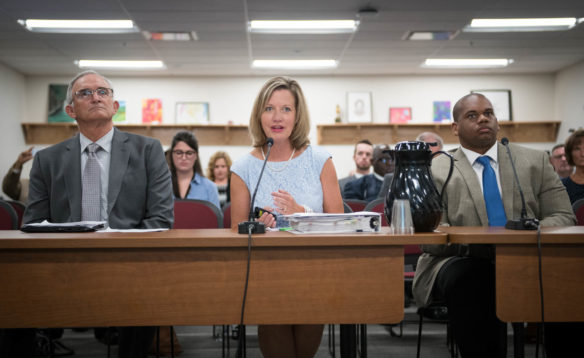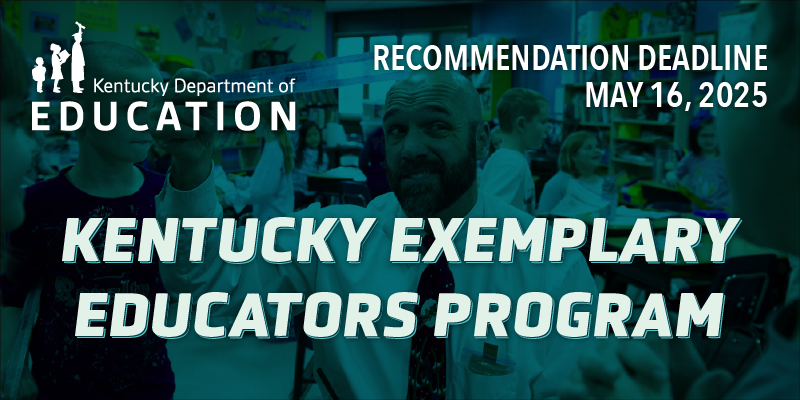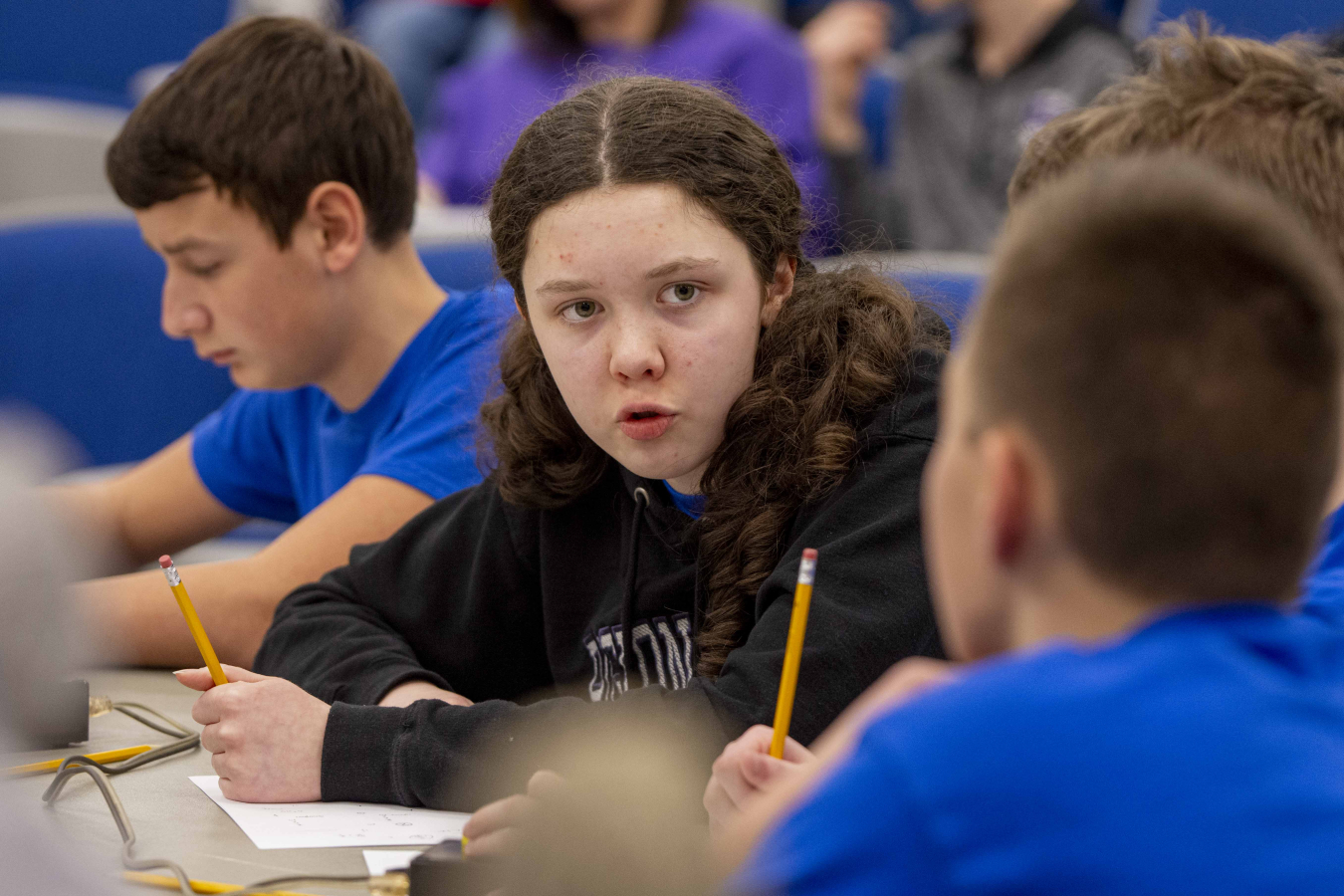
Associate Commissioner David Horseman, left, Associate Commissioner Amanda Ellis and Interim Commissioner Wayne Lewis address the Kentucky Board of Education during the first reading of the newly proposed high school graduation requirements during its Aug. 2 meeting. High school students would have to demonstrate foundational skills in reading and mathematics and achieve academic or career readiness to graduate, among other requirements.
Photo by Bobby Ellis, Aug. 2, 2018
(FRANKFORT, Ky.) – High school students would have to demonstrate foundational skills in reading and mathematics and achieve academic or career readiness to graduate, among other requirements, under a proposal before the Kentucky Board of Education (KBE) at its meeting in Frankfort Aug. 2. If approved in October, the new graduation requirements would take effect with the freshman class entering high school in fall 2019.
“What I am proposing significantly raises the bar for Kentucky’s high school graduates,” Interim Commissioner Wayne Lewis said. “These requirements ensure that a Kentucky high school diploma is meaningful to employers, postsecondary institutions and the student earning it.”
Under the proposal, to graduate, students would need to complete a minimum of 22 credits including:
- English I and II AND two additional English language arts credits aligned with the student’s Individual Learning Plan (ILP)
- Algebra I and Geometry AND two additional mathematics credits aligned with the student’s ILP
- 3 credits social studies (at least 1 aligned with the student’s ILP)
- 3 credits science (at least 1 aligned with the student’s ILP)
- 1 credit visual and performing arts
- ½ credit physical education
- ½ credit health
- 6 additional credits aligned with the student’s ILP
Students also would have to demonstrate proficiency in reading and mathematics on a 10th-grade test. If they do not pass, they could take the test twice in 11th grade and twice in 12th grade. If a student still does not pass, they would have the opportunity to demonstrate proficiency in reading and mathematics through an alternative portfolio process.
Students would be required to pass a civics exam, receive instruction in financial literacy, demonstrate competency in essential skills and technology, all as required by statute. As well, students would be required to demonstrate academic or career readiness as defined in the state’s accountability system.
The new minimum high school graduation requirements would be intended to provide schools and students with greater flexibility in their coursework. The proposed requirements provide a greater opportunity to personalize students’ course of study.
“For example, right now all students must take Algebra II, yet the data show many students graduate without the ability to perform even basic math skills. Rather than taking classes that might not be meaningful for them, students would benefit more by taking coursework that aligns with their plans for careers and postsecondary education,” Lewis said.
Board chair Hal Heiner and several board members suggested adding a requirement for a course in or at least exposure to career exploration. Lewis said staff would explore that option and bring it back to the board at its next meeting.
A written overview of the proposed changes in 704 KAR 3:305 is available online along with a comparison of the old requirements and the proposed graduation requirements.
Board reviews new and revised academic standards
The board also heard the first reading on new standards in computer science and revised standards in reading and writing, mathematics, health and physical education. Standards outline what students are expected to know and do in each grade to successfully transition to the next level of learning. Standards do not dictate the method of teaching used. Generally, the changes add clarity and improve alignment from grade to grade. The reading and writing standards add handwriting standards, and the mathematics standards add standards in advanced math. The proposed standards result from an extensive process of review and revision completed by Kentucky teachers, higher education representatives and community members.
The first reading of a new regulation governing the nontraditional instruction program also came before the board. Per Senate Bill 73 (2018), the regulation outlines how districts apply and are approved for the program. It also highlights the reporting and oversight responsibilities of the Kentucky Department of Education (KDE), including what districts must submit to the KDE to document “clear evidence of learning continuation” on nontraditional instruction days. The Kentucky General Assembly first created a nontraditional instruction program in 2011 to encourage the continuation of academic instruction on days when school would otherwise be cancelled due to health or safety reasons. In the 2018-2019 school year, 83 districts are participating in the nontraditional instruction program.
The board will consider approval of each regulation at its October meeting.
Board elects new chair and vice-chair; adopts revised vision statement
The board elected Hal Heiner as its new chair and Milton Seymore as its vice chair. It adopted a revised vision statement: “Each and every student empowered and equipped to pursue a successful future.” The KBE adopted as its mission: “To place Kentucky schools on a steep trajectory of improved student outcomes, the KBE will develop and adopt policies focusing on
- flexibility for district innovation;
- strengthening the skills and expertise of educators;
- increased family and community involvement;
- access to external supports for students and families;
- accelerated interventions for student learning;
- improved coursework completion by all students;
- transparent accountability reporting.”
Also in board business, KBE agreed to complete a full evaluation of Interim Commissioner Lewis at its October meeting and make a determination at that time on how to move forward with a commissioner search.
At its meeting, the board approved:
- amendments to 701 KAR 5:140, Districts of Innovation to provide clarity, and a more flexible, streamlined and efficient application process;
- a new district facility plan for Jenkins Independent;
- alternative models of school-based decision making (SBDM) at five schools in Daviess County Public Schools;
- Kentucky School for the Blind and Kentucky School for the Deaf Policy Adoptions and Amendments;
- Kentucky Education Technology System (KETS) School Year 2018-2019 Needs for Local Education Agencies;
- KETS Trust Fund – School Year 2018-2019 Allocation;
- an amendment to 702 KAR 7:065, Designation of Agent to Manage Middle and High School Athletics and Revision to Bylaws;
- the Statement of Consideration for 704 KAR 3:306, Kentucky Academic Standards for Historical and Cultural Influences of the Bible Elective Social Studies Course; and
- upholding the commissioner’s order as it relates to a nonresident dispute between Augusta Independent and Bracken County schools.
Also, at the request of Lewis, the board endorsed the formation of a Charter Schools Advisory Council. An executive order established the council last year. However, the legislature did not ratify the executive order. The re-established council will have a similar makeup and charge as it has in the past.
End-of-course tests eliminated for high school students
In his report, Lewis said in the 2018-2019 school year, high school end-of-course tests will not be administered. Instead, reading and mathematics will be assessed on the 11th-grade college admissions exam. At grade 11, a new operational assessment in science will be administered, and the on-demand writing test will continue. Students will participate in field tests for new Kentucky assessments in reading and mathematics. A social studies assessment will be created once new standards are adopted.
During his report, Lewis announced a reorganization of the Kentucky Department of Education. While details are still being finalized, he said the changes are intended to create greater efficiency in the department and better align the department’s organizational structure with KDE’s identified priorities. The new organizational structure will be announced at a later date.
Materials for the meeting are available on the Kentucky Board of Education portal.
The board has tentatively scheduled a special meeting on Sept. 5 in Frankfort for setting standards in support of Kentucky’s new accountability system.
The next regularly scheduled Kentucky Board of Education meeting is scheduled Oct. 2-3 in Frankfort.




That is all and good but what about the students that are currently in middle school that has been passed on even though they cant read now. How is that the students fault, so if they cant pass the test their stuck even when the school and teachers suck, that’s wonderful.
We are developing plans for extra supports. The goal of this change is to make sure that students do not slip through the cracks. As we get closer to implementation in 2020, we will be seeking feedback from parents, teachers and students on what those supports need to look like.